After years of building WordPress websites, we’ve learned how important it is to have a local WordPress setup on your computer.
Having WordPress on your personal machine lets you experiment with new features without risking your live site, dive deep into WordPress development, and even build entire websites before they go live. It’s like having a private sandbox for all your WordPress projects.
If you’re a Windows user, there are numerous ways to set up WordPress locally. But we’ve narrowed it down to the two easiest methods. In this guide, we will show you how to easily install WordPress on a Windows computer, no matter which version you’re using.
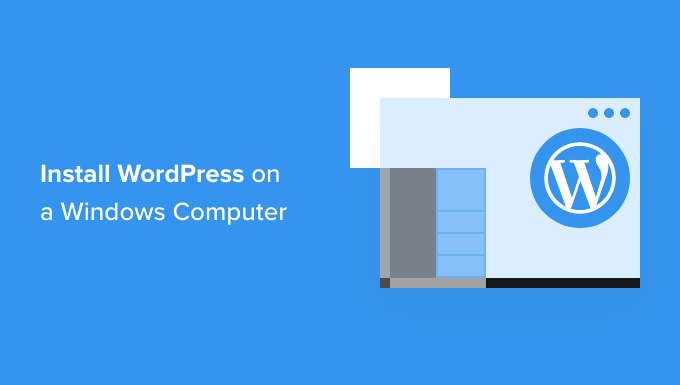
Why You Should Install WordPress on Windows?
If you’re a Windows user, then installing WordPress locally on your computer offers several benefits.
A local WordPress installation creates a testing environment that doesn’t affect your live website. This setup, often called a local server or localhost, is your personal playground for WordPress.
WordPress developers regularly use local installations for their work. For instance, they may use it to experiment with new plugins or themes or test the site before updating to the Gutenberg block editor.
But it’s not just for the pros. If you’re new to WordPress, a local setup is perfect for learning. You can explore features, test themes and plugins, and experiment freely without worrying about breaking a live site.
It’s important to note that when you install WordPress locally on Windows, only you can see the site. If you want to create a public website, then you’ll need a domain name and web hosting.
Now, technically, you can install WordPress on Windows using XAMPP, and we’ve written a tutorial on it before.
That being said, we’ve found 2 even simpler ways than XAMPP for setting up a local WordPress environment, making them great for beginners or users who need to create a local site quickly. You can click the link below to jump ahead to any method you’re interested in:
Method 1: Install WordPress on Windows Using Studio (Quick and Simple)
For the first method, we will use Studio. It’s a local WordPress software made by Automattic, the company that manages and runs WordPress.com, which is a website builder based on the WordPress software.
We will talk about this method first because it’s much quicker and simpler to follow, making it perfect for complete beginners.
First, you need to open the Studio by WordPress.com website. Then, click on the ‘Download for Windows’ button.
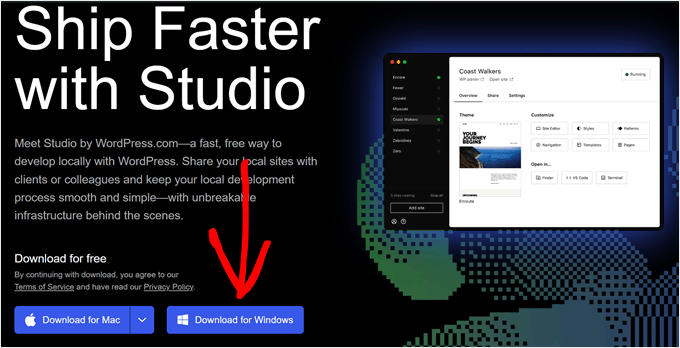
Once you’ve done that, just open the downloaded file to start the installation.
A popup window will now appear, showing you that the application is being installed.
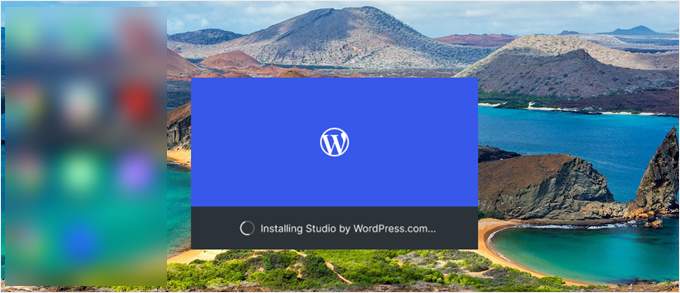
With that done, you can add your first site.
To do this, just enter your new local WordPress site name and click ‘Add site.’ You can name the site however you like so long as it helps you easily identify it.
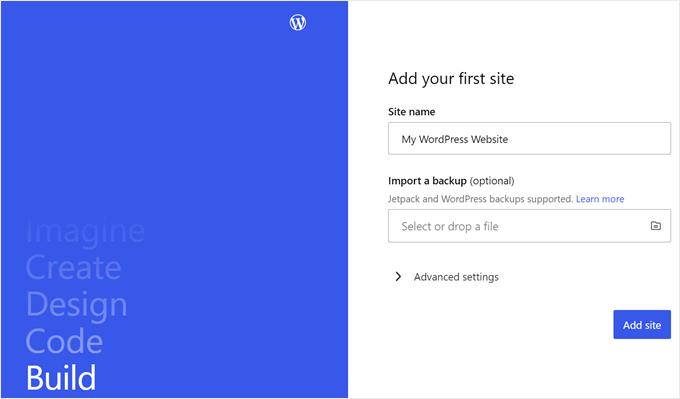
You should now see your local WordPress site dashboard.
To access your WordPress dashboard and edit your website, just click the ‘Start’ button at the top right corner. This will make your local website accessible to you on your computer.
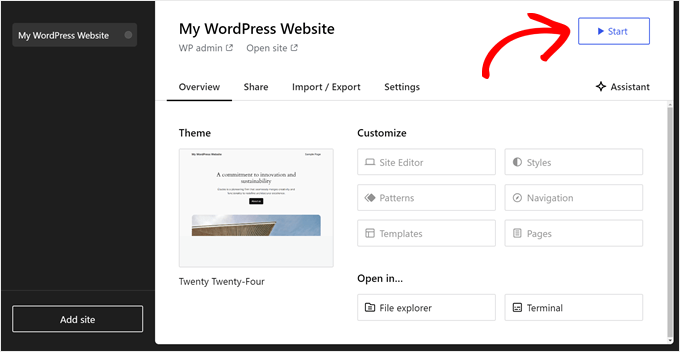
Once the ‘Start’ button changes to ‘Running,’ you can click on the ‘WP Admin’ link at the top left side of the page.
This will bring you to your local WordPress admin page.
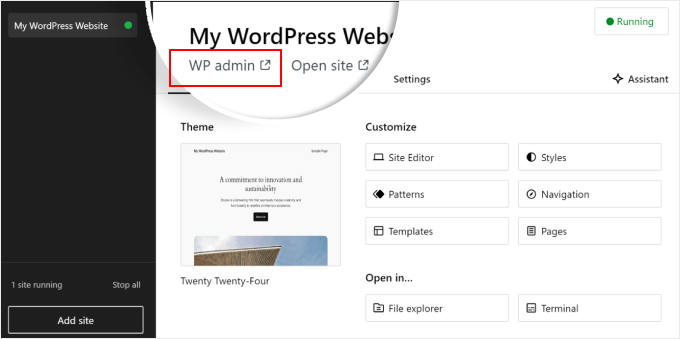
And that’s pretty much it for the setup. Let’s explore the other settings that may be necessary as you build your local website.
As you can see in the ‘Overview’ tab, you can immediately access the WordPress full-site editor menu right from the Studio dashboard. You can also click ‘File explorer’ to open your WordPress website’s folders and files and click on ‘Terminal’ to manage your website using WP-CLI.
If you switch to the ‘Share’ tab, you can log in to your WordPress.com account, clone your local website, and upload it to WordPress.com’s servers. This will temporarily make the cloned site online, which is useful for sharing demo sites with your clients or team members.
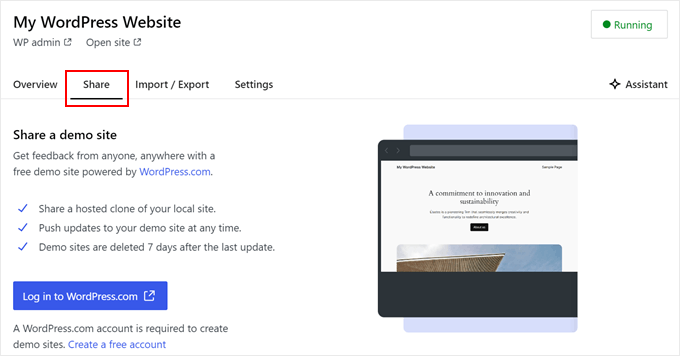
At times, you may want to log in to your local website directly through your browser instead of using Studio. In that case, you need to know your wp-admin credentials.
To find them, you can switch to the ‘Settings’ tab and find your WordPress admin username, password, and login URL there.
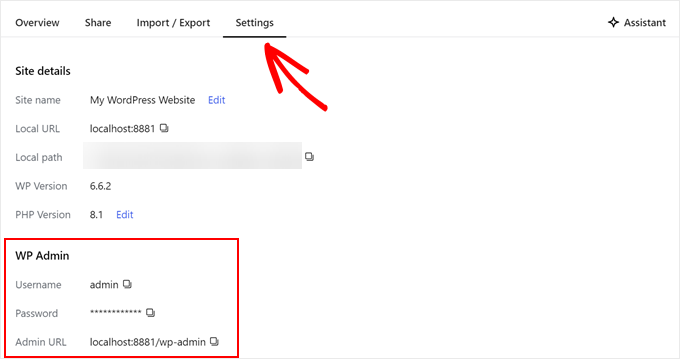
Another neat feature of Studio is its built-in AI chatbot, which you can communicate with by clicking on the ‘Assistant’ button.
Here, you can ask Studio for help with tasks like updating all your plugins at once, updating your core WordPress version, or creating code for a custom block.
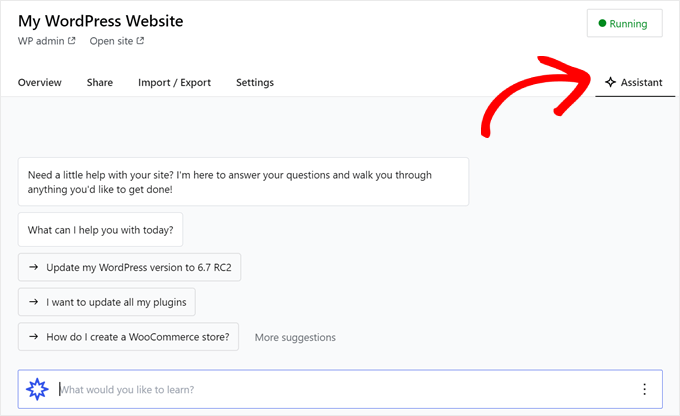
When you’re done working on your local site, just hover over the ‘Running’ button at the top right corner until it says ‘Stop.’
Then, click on the button to stop the website.
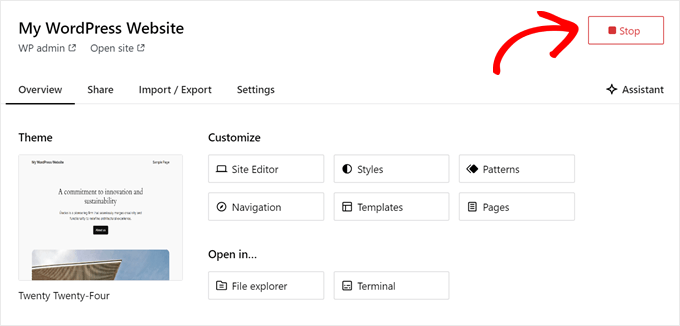
One downside of Studio is you cannot configure the WordPress environment to your liking. This means you need to use the PHP version, web server, and database that have been pre-selected for you.
This can be a drawback if you need to test your website or plugin with specific server configurations.
If you require more control over your local WordPress environment or need to match your local setup with a specific live server configuration, then you can check out the next method using Local WP.
Method 2: Install WordPress on Windows Using Local WP (More Customizable)
First, you need to download and install the Local WP software on your Windows computer. Simply go to the Local WP website and click the ‘Download for Free’ button.
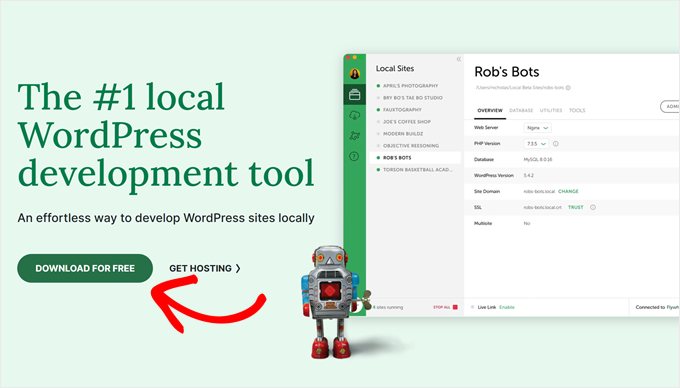
After that, a popup window will appear where you’ll need to select your platform. Go ahead and choose ‘Windows’ from the dropdown menu.
Next, you can enter your details like first and last name, work email address, and phone number to download the software.
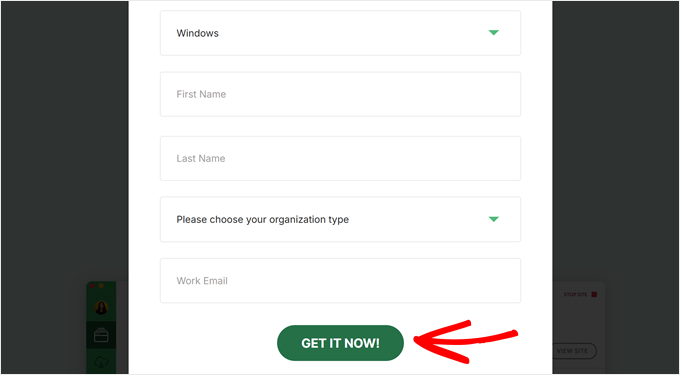
Upon entering the details, simply click the ‘Get it Now’ button.
After that, the software will be automatically downloaded into your computer. Otherwise, you can click on the ‘click here’ link to start the download.
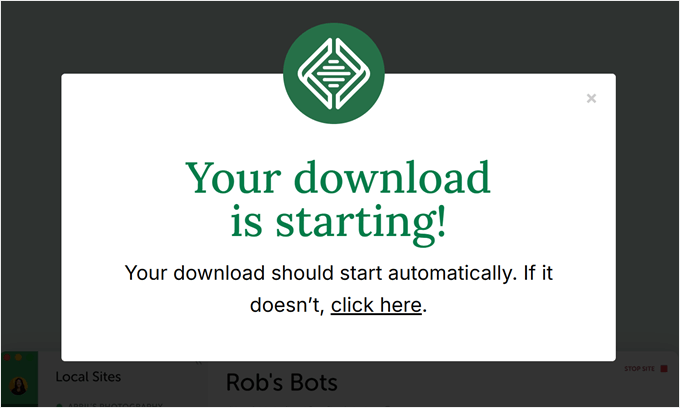
Once the file is downloaded, go ahead and launch the setup wizard.
Now, you’ll need to select whether you’d like to install the software for all users or only for you.
Once you’ve selected an option, click the ‘Next’ button.
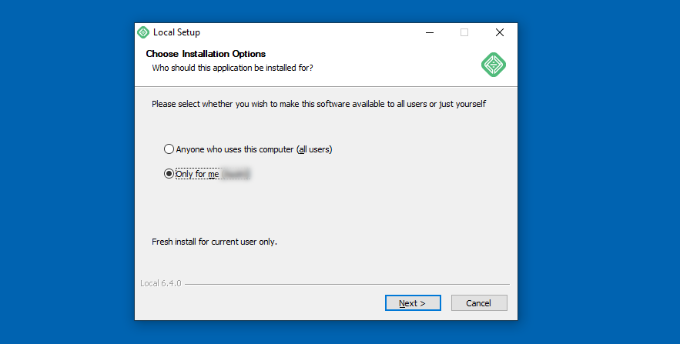
In the next step, you can select the ‘Destination Folder’ where the software will be installed.
Simply click the ‘Browse’ button to set the path and then click the ‘Install’ button.
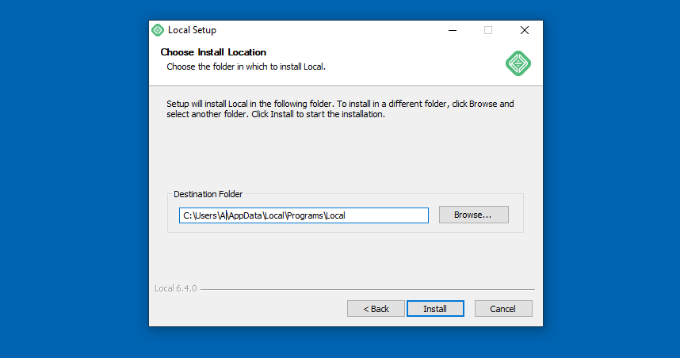
The Local WP software will now install on your Windows computer.
Once it’s done, you can check the ‘Run Local’ checkbox and click the ‘Finish’ button in the setup wizard.
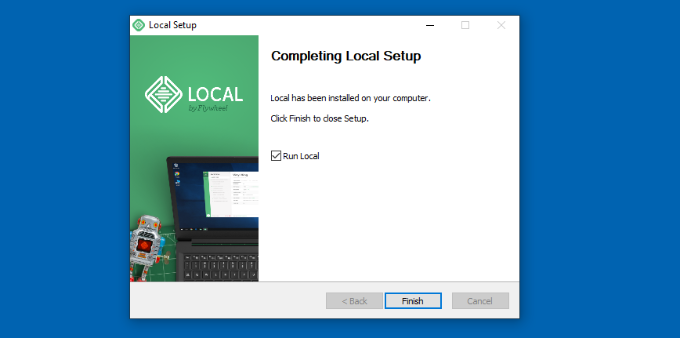
The software will now launch on your Windows device.
The next step is to add a new local website. To do that, simply click the plus ‘+’ button at the bottom.
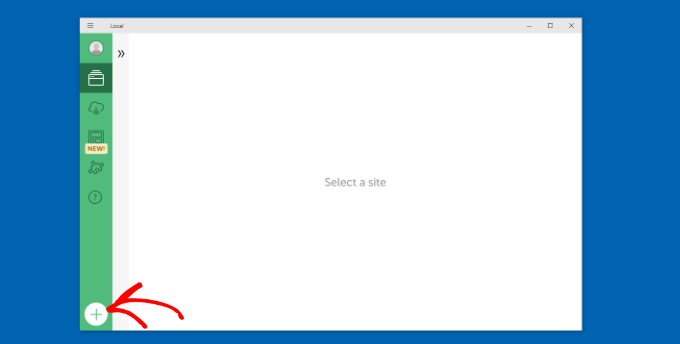
After that, you can create a site in the Local software.
Select the ‘Create a new site’ option and click the ‘Continue’ button. There are also options to create the site from a blueprint or an existing website file, but we’ll go with the first option for the sake of demonstration.
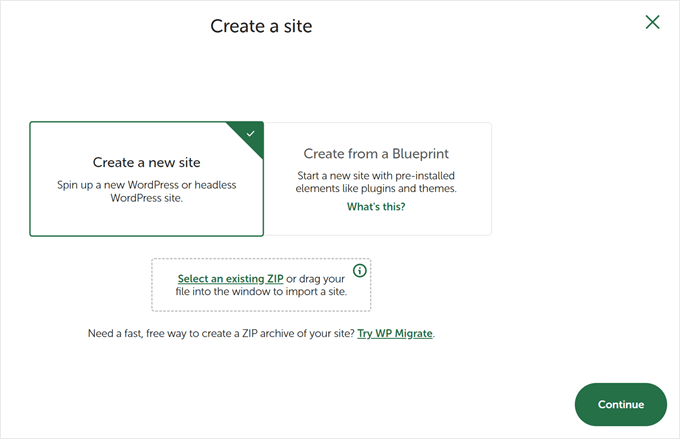
Next, you can enter a name for your local website, like ‘My WordPress Website.’
There are also advanced options where you can enter the local site domain and local site path. By default, the domain will use your website title but separated with dashes.
Once you’re done, simply click the ‘Continue’ button.
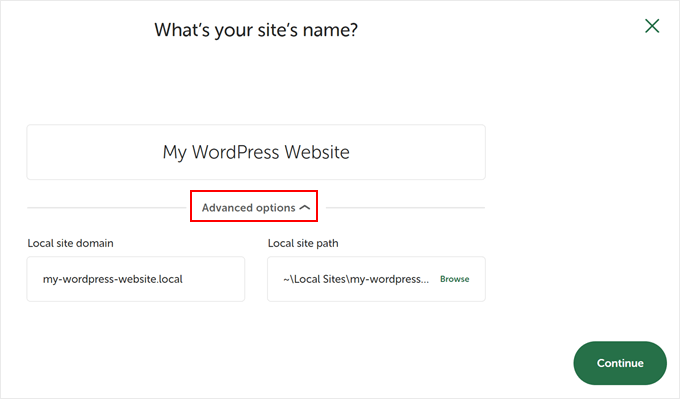
After that, you will need to choose an environment for your local website.
You can use the ‘Preferred’ environment where the software will automatically select the PHP version, web server, and MySQL version. On the other hand, you can also select ‘Custom’ and enter the environment details.
Local WP offers the latest PHP versions. As for the web server, you can choose between Nginx or Apache. You can also select between MySQL or MariaDB for the databases.
Do note that some PHP, web server, and database versions require downloading some dependencies for them to work properly.
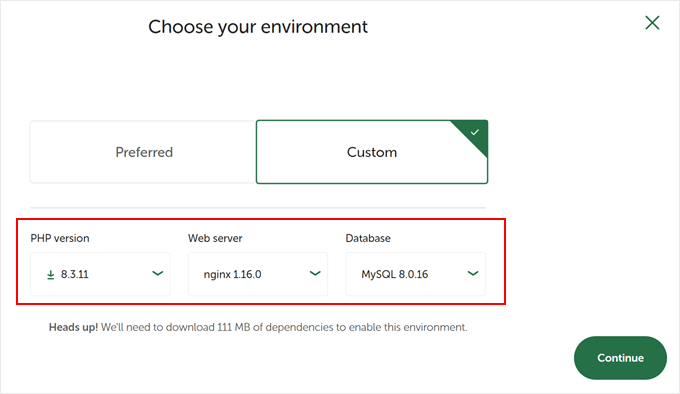
Next, you can enter a WordPress username and password for your local website. Plus, there’s also an option to choose a WordPress email address where you’ll receive all the email notifications.
Other than that, there is an advanced option where the software will ask whether you have a WordPress multisite network. If not, just click ‘No.’
After entering these details, simply click the ‘Add Site’ button.
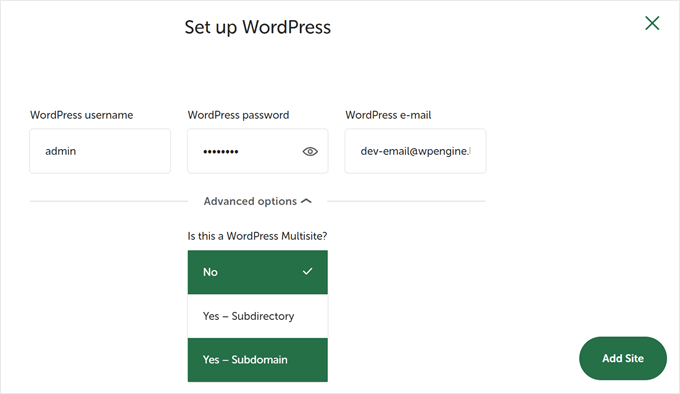
The software will now install WordPress and set up your website.
To launch the local website, go ahead and click on the ‘Start site’ button at the top right corner.
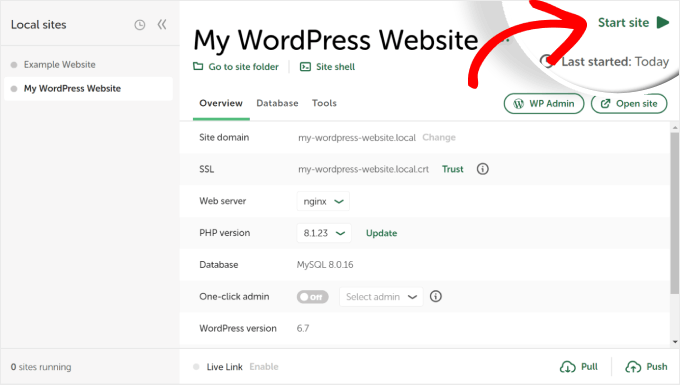
Next, click on the ‘WP Admin’ button, and you’ll see the WordPress admin login page.
Simply enter the username and password you entered earlier when setting up the local website, and then click the ‘Log In’ button.
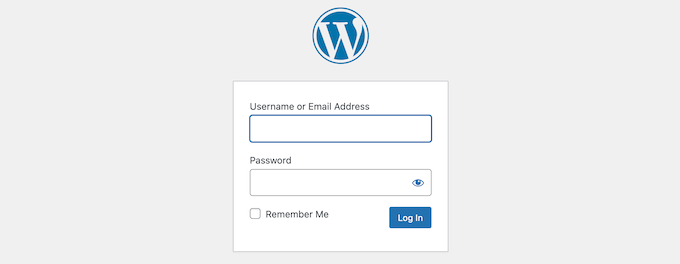
You can now edit your local website on your Windows computer.
When you’re done, don’t forget to stop the website from the Local WP software by clicking the ‘Stop site’ button.
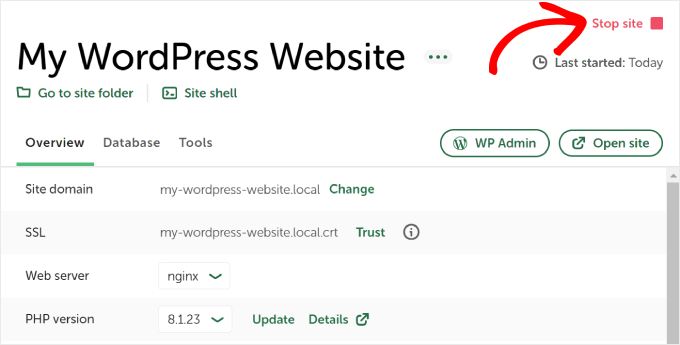
Pro Tip: If you want to skip the login process, you can enable a one-click admin login in Local WP.
To do this, just go back to the Local WP dashboard and toggle the ‘One-click admin’ button until it says ‘On.’ Then, in the dropdown menu, select the admin user that can use this one-click login feature.
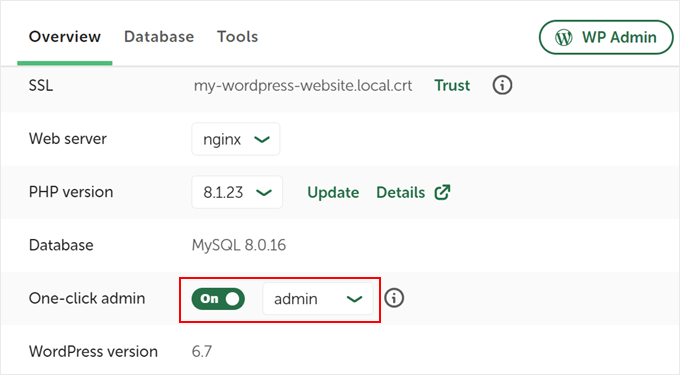
Alternative: Use WordPress Playground to Test Themes, Plugins, and More
WordPress Playground is an innovative tool that lets you experiment with WordPress directly in your web browser. It’s a virtual sandbox where you can try new WordPress themes, plugins, and features without affecting any real website.
WordPress Playground differs from a local WordPress environment in several key ways.
First, it doesn’t require installation on your computer and resets after each use, unlike permanent local setups. You can access it from any device with a browser, while local installations are tied to one computer.
While WordPress Playground is ideal for quick tests and learning, a local WordPress environment on your Windows computer offers more flexibility for long-term development projects.
For a detailed walkthrough, check out our guide on how to use WordPress Playground in your browser.
I’ve Installed WordPress on My Windows Computer, What Now?
Now that you have WordPress on your computer, here are some things you can do:
- Learn basic WordPress tips and tricks to use your site better.
- Try different WordPress themes to see how your site can look.
- Install and test must-have WordPress plugins to add new features to your site.
- Learn how to fix common WordPress errors on your own.
- Try different drag-and-drop page builders to make your site look nice.
- Learn how to reset the WordPress admin password on localhost to recover access to your site.
- Set up automated workflows to make managing your site easier.
- Learn about WordPress security to keep your site safe from hackers.
- Move your local WordPress site to a live server when you’re ready to share it with everyone.
We hope this article helped you learn how to install WordPress locally on a Windows computer. You may also want to see our article on how to install WordPress locally on a Mac computer and our ultimate guide to creating a WordPress staging site.
If you liked this article, then please subscribe to our YouTube Channel for WordPress video tutorials. You can also find us on Twitter and Facebook.





muya chris
thank you for this article
young baykay
i thought this was to install WordPress as an app on windows not knowing its just another way of creating a WordPress site. buh i have to say that its really interesting and i learn’t something new and the whole process went well..(thumbs up)
WPBeginner Support
Glad you found it helpful, don’t forget to join us on Twitter for more WordPress tips and tutorials.
Admin
Miha
This has made my day. Thank you!
Hena
Oh!! you are awesome!! thank you very much
Abhishek sharma
Thanku very much it was very helpful.
Diego Marrs-Segura
What if you already have a Wordpress account and site but you’re still required to fill in the installation form?
Jean Tildesley
Very helpful article, but when I got to setting up a database for WordPress and clicked on phpmyadmin as instructed, it opened up a localhost page with no content. Can you help please?
Regards,
Judy H
Everything installed correctly and I set up a practice web page. After working on it for awhile I left it for several days. When I attempted to log in to the WP admin site for the test web page, it wouldn’t recognize my password. Any ideas on why this happened or how to recover/reset the password?
Thanks!
Perfect ttorial
thank you very much for this perfect tutorial….all installin done…..now will try the creation
Sarah Alyea
Everything worked fantastic. Until I tried to upload the Divy theme and DivyBuilder plugin.
Received this message for both: The uploaded file exceeds the upload_max_filesize directive in php.ini.
What to do? Any advice?
tommyt
awesome post,
worked like clockwork,
thanks so much for this great post.
Tom
Zaeem Shah
your tutorial was amazing before this tutorial i didnt know about even how to download wordpress on local host after that i am able to download and the main thing is that i am able and got expert in designing a professional website by wordpress thanksss aloot u r doing good job God bless you
Shana
Followed directions and I am getting a
“No webpage was found for the web address:
http://localhost/phpmyadmin/Search Google for localhost phpmyadmin
HTTP ERROR 404
error.”
any ideas?
Shana
This problem is fixed.
Had to change the port listeners in Apache httpd.conf to port 8080.
There are 3 listeners to change.
Also must change the port preference in >Tools>Use a port other than 80.
Once clicked, it will automatically change it to 8080, or whatever port you have changed to. I suggest using 8080.
Hope this helps!
vasudevan
thanks! that helped me. you coul have also mentioned that the tools is accessed by right clicking the icon!
Bala
easy to follow the instruction, my test site on my desktop was up and running in 15 min. Thanks
WPBeginner Support
Hi Bala,
Glad to hear that Don’t forget to follow us on Facebook for more WordPress tips and tutorials.
Don’t forget to follow us on Facebook for more WordPress tips and tutorials.
Admin
Philip Venable
After Wamp installed I attempted to open phpMyAdmin and received this message in Chrome: This localhost page can’t be found
No webpage was found for the web address:
http://localhost/phpmyadminHTTP ERROR 404
Shana
try changing the port in Apache.
Claire
I am having this same error, any solutions yet please
Megha D R
It was very helpfull… The steps and links mentioned in the article are perfect….
Thank you
EIRINI TZIMA
Hello guys, great job!
I followed your advice step by step up to this point: Now open your web browser and go to http://localhost/mysite/
The WordPress database setup will start automatically.
Although the http://localhost/mysite/ seems ok and shows that
ndex of /mysite
[ICO] Name Last modified Size Description
[PARENTDIR] Parent Directory –
[DIR] __MACOSX/ 2017-03-11 22:45 –
[DIR] betheme-premium-word..> 2017-03-11 22:45 –
Apache/2.4.23 (Win32) PHP/5.6.25 Server at localhost Port 80
Wordpress itself doesn’t start automatically so now i am stuck here.
Any suggestions?
Thank you so much in advance!
BR,
Eirini
Shana
I am having the same issue.
Any ideas?
Marc De Bodt
I’m also getting the same issue…
Hanif Fadilah
Really useful tutorial, exactly what i was looking for, thank you very much
Cliff
Fantastic tutorial and so easy to follow.
Now to create my test website!!
Thanks
Reg
Can I lift a Wordpress site I already have, along with its theme, widgets etc, and put that onto my local computer and then process that Wordpress website into another theme. My main reason for having an interest in this is that when I tried to migrate my Wordpress site to a new theme it went wrong. Thankfully I had backed it up and so I could just do a restore. But I would like to move the content into a different theme.
WPBeginner Support
Hi Reg,
Yes, you can. This is one of the main reasons people install WordPress on their computers to work on their themes before it goes live. Please see our guide on how to move a live WordPress site to local server
Admin
Sirmee
Thank you so much for the good work. it was easy and straight to the point. More grease to your elbow
Stewart
Fantastic guide. Simple and easy to follow. I now have a test WP site. Many thanks
Olman
I solved my problems!
Note that my first problem was that when copying wordpress into wamp, I only copied wp-admin and not the entire wordpress folder.
The second problem (“Error establishing connection”) was the the form had auto-filled a password (“Password”) and so was actually not blank.
Olman
I am receiving the following error message:
“Error establishing a database connection”
Any advice on correcting this?
Gary
I am trying to upload a new theme from a zip file and keep getting this error “The uploaded file exceeds the upload_max_filesize directive in php.ini.” I opened the php.ini from within Wampserver php tools and changed it to 25MB but still same error. Please help
Ed
Thank you for this article. Very helpful and informational!
We want to build a Wordpress-based Intranet. Is this the process for installing WordPress on a local server first, then using the All-In-One Intranet plugin after?
omar
I don’t have WAMP or anything like that, but I have apache, php and mysql installed and it worked for development like that for a while already and it works fine, but when I am trying to install Wordpress 4.7.2 on step 2 i get the HTTP 500 status.
The 127.0.0.1 page isn’t working
127.0.0.1 is currently unable to handle this request.
HTTP ERROR 500
I have PHP 7.0.8.
Any thoughts?
Collins
This was helpful. But i have a problem. Anytime i tried access my dashboard (wp-admin). There is always a note. It says “Sorry you are not allowed to access this page”. I need your help to ratify the situation. Please
WPBeginner Support
Hi Collins,
First, make sure you are accessing /wp-admin/ and not a page inside wp-admin like /wp-admin/some-page.php. If the problem persists, then follow our WordPress troubleshooting guide to figure out whats causing the issue and how to fix it.
Admin
Kevin
Great Tutorial, but i have a quick question.
How would i set up a local copy of a wordpress site from a backup? ive offered to help with someones site and i want to install a copy locally which will include a ‘full’ site, webpages and database, to help make the development alot quicker than just uploading stuff to the online test server every time.
Nev Lime
This was a great help
Thank you
Pedro
When I click on phpMyAdmin, it asks for a username and password. Where do I get this information from?
Thank you.
Pedro
WPBeginner Support
Hi Pedro,
You can get this information your hosting account’s cPanel dashboard.
Admin
Lyle Peterson
Where does the installation program look for VCRUNTIME140.dll? I have it on my computer but the program won’t start because that .dll is not installed.
Alpheus
hello guys, i find it hard to download the wordpress any one with a clue pls.
sean burns
I’m stuck here-
Installing WordPress on Windows with WAMP
Download a copy of WordPress from WordPress.org. Extract the zip file and copy the wordpress folder. Go to C:\wamp\www (when I paste this to a browser nothing happens) and paste wordpress folder there. You can rename the wordpress folder to anything you want for example mysite, wpbeginner, etc.
Alexander Stevenson
I hope you solved you problem by now, but in case anyone else has an issue here’s what happened.
I highly recommend against using a browser to access that. That is specifically storage space on your computer. If you go to My Computer you should see Local Disk (C:). This is what the C:\ means. When you open the disk (by double-clicking on it) you should see a list of folders such as Program Files, Windows, and wamp. Open the wamp folder and look for a folder named www. Open that folder, and then paste the wordpress folder in it.
Martina
thanks a lottttttttt. Now I can make my web. I Love you guys.
I don’t know why people can’t help, it does not matter I’m glad I found you.
WPBeginner Support
Hi Martina,
You are welcome we are glad you find WPBeginner helpful. Don’t forget to join us on Twitter for more WordPress tips and tutorials.
we are glad you find WPBeginner helpful. Don’t forget to join us on Twitter for more WordPress tips and tutorials.
Admin
Seth Solanki
HI, I’ve installed WAMP64 and Wordpress. I can add pages in Wordpress but cannot edit them. I can create new pages and change themes but cannot add or edit any page content. Is this possible?
Carrie
I have a stupid question. I took a beginners wordpress class which totally sucked!
Anyway, they had me use Microsoft webmatrix instead of WAMP. The webmatrix does not work correctly. Could I install WAMP or must I now use MS webmatrix? If I do this, will I use the project I was working on for the class?
I totally lost….
Thanks
Younes Ouahrani
when i click phpmyadmin its shows that im not connected on the browser , any help guys ?
Poonam Paul
My WAMP install went smoothly and created two databases correctly. There are 2 databases and 2 config.php files in my wordpress website. The path for both databases are example.com/httpdocs/wp-config.php and example.com/httpdocs/wordpress/wp-config.php. Both databases have different DB_NAME, DB_USER, DB_PASSWORD, butDB_HOST (IP address) is same.I install httpdocs folder into the www folder properly. I enter db_host in both databases are localhost.
Now when i view the site and open localhost/wordpress/wp-admin, the error is…
This site can’t be reached…localhost refused to connect…ERR_CONNECTION_REFUSED
Gobind Singh
Thanks Sir!! You made it very clear and simple.. I have been trying to do this from a long time. But today I found this article and did it in a flash. I’m really grateful. Thanks.
WPBeginner Support
Glad you found it helpful Don’t forget to follow us on Facebook for more WordPress tips and tutorials.
Don’t forget to follow us on Facebook for more WordPress tips and tutorials.
Admin
Divine
You guys are the best..though I had issues installing my WAMPserver but I managed to fix it. Sincerely this article helped me as i was told by a friend to pay thousands of Nigeria naira before he can help me. More of these guys!!!
WPBeginner Support
Glad you found it helpful. Don’t forget to join us on Twitter for more WordPress tips and tutorials.
Admin
Anatole
You made it very clear and simple to follow. Worked a treat and I didn’t even need to watch a video online. Many thanks.
Alexander
Thanks for the effort you put into this tutorial. Finally my first wordpress test blog is running on wamp.
Geoffrey
My WAMP instal went smoothly (updated the Visial C++ packages) ..created a database called wordpress
My wordpress instal into the www folder went smoothly
When I open localhost/wordpress/wp=admin I see that the Twenty Fifteen theme is active.
But wen I view the site or sample page….I don’t see any evidence that the css of the theme has been invoked…just a very plain looking page
Yes, this is all new to me….I’ve missed something obvious I hope…what did I miss doing>
harish negi
how to test vaultpress backup in the local wordpress?
steph
hi, may i know how could actually installl phpMyAdmin? Where to get username and password to login in. Thanks
Sthe
Can I create a wp website while offline?
WPBeginner Support
Yes you can. However, you may need an internet connection to get help or check out tutorials.
Admin
Jose Luis
Hello, just thought i’d let you know that in order to access the localhost you can use root as user and leave the password field in blank.
Thanx for this article
mikmoken
Thanks for this instructions and tutorials on how to install wordpress using wamp. It helps a lot for us beginners.
WPBeginner Support
Hey mikmoken,
Glad you found it useful You may also want to subscribe to our YouTube Channel for WordPress video tutorials.
You may also want to subscribe to our YouTube Channel for WordPress video tutorials.
Admin
MelR
Thanks guys at long last and 70 years of age I’ve achieved it! Thanks to you guys cheers!!
WPBeginner Support
Hey @MeIR,
We are glad you found it useful You may also want to subscribe to our YouTube Channel for WordPress video tutorials.
You may also want to subscribe to our YouTube Channel for WordPress video tutorials.
Admin